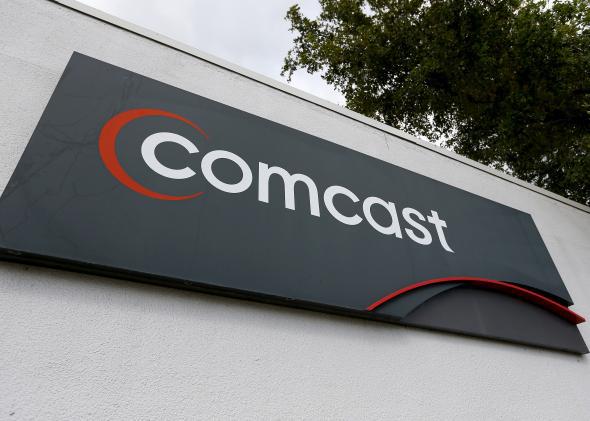Comcast’s effort to purchase Time Warner Cable and form a behemoth that would dominate the industry has people naturally worried about competition. As Goldman Sachs recently argued, oftentimes the best reason to merge is to reduce choice and screw customers. Any time the No. 1 and No. 2 players in an industry want to combine, these concerns will exist.
But in this case, consumers aren’t losing much choice. The cable industry is uncompetitive today not because any one cable company is so large but because the vast majority of specific places are only served by one company. In a few places, you might have two choices. Robust competition is rarely on the table, and in most areas it doesn’t exist at all. In other words, a merger would take cable competition from zero to double zero and thus there isn’t really much to worry about.
The real issue posed by the merger, however, relates not to cable television but to broadband. And it pertains not so much to competition per se as to regulation. A world in which the broadband Internet market is both uncompetitive and highly concentrated is one in which the stakes for proper regulation are extremely high. If policymakers aren’t prepared to deliver that regulation—or if voters don’t trust that it will be forthcoming—then putting all our Internet eggs in the basket of a single giant horizontal monopoly is risky indeed.
But first to cable.
The bad news is that 20 years of policy nominally inspired by the desire to create a competitive market for pay television have failed. Prices for basic cable packages are higher than ever. Basic cable packages also offer more channels than ever before, but extra channels have sharply diminishing marginal returns. In an uncompetitive market, providers are essentially forcing consumers to swallow a much bigger and more expensive bundle than they otherwise would buy. For households with many members and diverse tastes, this is a decent deal. But for the typical consumer it’s a bit of a rip-off.
The good news is that the cable television market is less relevant every day. Satellite offers a decent second option for many people. More to the point, cable providers now need to compete with cord-cutting. Netflix, Hulu, Amazon, the iTunes store, etc. increasingly make it possible to watch lots of TV shows without paying for television. App-based streaming options increasingly exist even for live sports.
Unfortunately, in the vast majority of cases the only provider of the really fast broadband Internet that could make cable superfluous is … the local cable company. Consequently, though high-speed Internet purchased as an add-on to an expensive cable package is generally quite cheap, standalone Internet access tends to be very expensive. In essence, when selling broadband, the cable company is competing primarily with itself, so it has no incentive to be aggressive on price.
This problem, though severe, isn’t actually made worse by cable companies merging. From a consumer viewpoint it is, again, zero versus double zero. But for the issues that go upstream from the cable company rather than downstream, horizontal integration does matter.
Consider the issue of “network neutrality,” the principle—currently embattled—that broadband providers should treat all bits equally rather than cutting special deals with certain firms. This would be a good idea in almost any case. But a world of highly fragmented broadband providers would be a world in which the net neutrality stakes were relatively low. In practice, some random town’s cable company isn’t going to have the bargaining power to extract financial concessions from Internet giants like Google or Amazon and won’t have the motives or the resources to lock out small players. But a broadband giant serving almost half the households in the country would be very dangerous indeed. Its client base would be so large that it could force big, rich tech companies to send it side payments to avoid throttling their services. Startups and small players would simply have to accept second-class Internet service. Any failure to articulate and rigorously enforce network neutrality principles would stifle innovation and redistribute economic surplus to the uncompetitive broadband sector.
A similar issue exists with vertical integration. In addition to being a cable service provider, Comcast owns NBCUniversal—a major movie studio and a bunch of television networks. In a world where Comcast’s broadband Internet operation was small, this would raise no major concerns. But if Comcast grows to cover a huge swath of the country, then it could use its quantitative domination of the cable market to gain an edge in the much more competitive market that pits channel versus channel. Like the network neutrality piece, this can, in principle, be addressed through regulation.
Despite all the 21st-century technology, the supersizing of Comcast is part of a very old debate in the United States. Theodore Roosevelt famously took the view that the federal government needed to “bust the trusts”—cut America’s most enormous firms down to size. Woodrow Wilson thought instead that big business was fine; it simply needed to be regulated. In the case of the interlinked broadband and cable markets, either approach is plausible. For the moment, the federal government has been regulating with a light hand even in the absence of robust competition, allowing the cable industry to consolidate. That’s a recipe for high prices and slow innovation. The bigger the cable giants get, the more rigorously the Federal Communications Commission needs to wield the regulatory stick. And if regulators aren’t up to the job of monitoring potential misconduct, they need to take the crude approach and insist on cutting these companies down to size.
